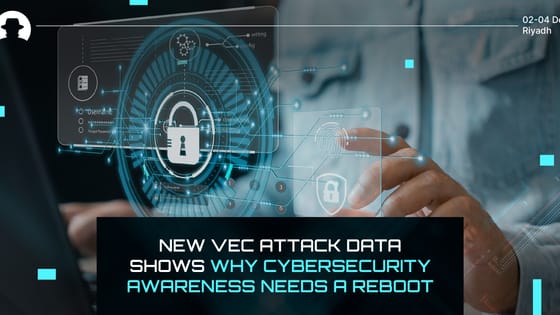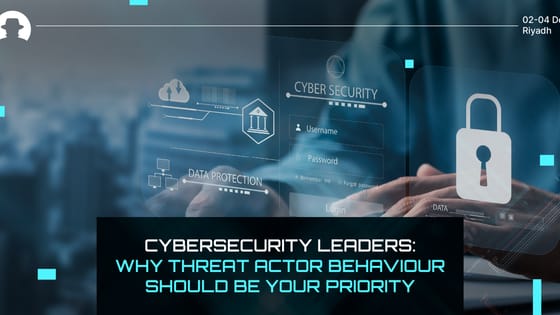
New VEC attack data shows why cybersecurity awareness needs a reboot
New research on vendor email compromise attacks shows that nearly half of employees fall for malicious emails, and 98.5% go unreported.
Read More
At #BHMEA22 Mohammed Almeshekah (Founder and Managing Partner at Outliers Venture Capital) and Kenzie Falcoz (Head of Platform at Outliers Venture Capital) shared a briefing about investments in cybersecurity companies that are working across the US and MENA corridor.
Outliers VC invests in cybersecurity as a core area, and as a company that bridges the MENA region and the US, it’s uniquely positioned to understand international market behaviour.
“I think we’re living in a very interesting time,” Almeshekah said. “When I started my company seven years ago, there were no venture capital investors here [in Saudi Arabia]. There were mostly traditional investors…and when you look today, we have a massive amount of transformation.”
The innovation in cybersecurity startups and products that has taken place in more mature markets, including the US, has filtered through to the MENA region – and US companies are increasingly building their presence in the region too.
Almeshekah and Falcoz noted that for US portfolio companies, Outliers VC offers access to the MENA and GCC markets.
While there are lots of investors in major markets like the US, Outliers helps companies understand and network in markets that have different working practices to their own – with a diverse team of investors who have all worked both in the US and in the MENA region.
And at the same time, this brings much needed innovation to the MENA region – which (as an accelerating digital economy) needs new products, services, and skills.
“The challenges and the bad actors and the geopolitical tensions always create more attackers that come to the region,” said Almeshekah, “and bringing this innovative technology here will always help elevate the security here, but will also help the companies tackle and access a much more addressable market globally, not just focusing on one single market.”
“This is what we uniquely do: helping companies at the early stage reach the market and bring their innovation here.”
As well as enabling access to the MENA and GCC markets for US cybersecurity companies, Falcoz said, Outliers VC is also driving the growth of scalable cybersecurity businesses that are built by MENA founders.
Because one problem that many local cybersecurity startups have is that they’re often service-based businesses. And they’re great, Almeshekah said; “they come and provide a service to a client. But the challenge is that their ability to grow exponentially is very limited, because they’re capped at their ability to hire the human resources.”
“They can’t get what we call a venture-scale growth with a services-based company. But what we’re excited about is we’re starting to see a couple of companies in the region that are starting to develop unique products and insights that target some problems here that are global in nature but have some locality element too.”
“That’s what we’re looking for — we meet a lot of companies, and what we tell them is to think about how you move from being a services-based business into a product-based business.”
That way, you can expand without the need for your team to keep growing.
Falcoz noted that it’s interesting to touch on the talent aspect of startup growth in the MENA region, because “there’s a lot of talent coming back to the region, wanting to solve problems and build incredible businesses.”
Almeshekah agreed – “I think this is one of the most exciting things about the region.”
If you talked to a computer science student in college ten years ago and asked them what they want to be doing five years after graduating, “they would tell you: government or large corporates.”
But if you ask the same question today, a growing number of students are interested in starting their own companies.
“I see fresh out of college computer science graduates going and working for startups. And this is very exciting because they learn how to start a company, how to run a sales process, how to build, how to attract clients, how to do client support — they’re in a team of fifteen people and they learn all of those skill sets. And we’re starting to see the ripple effect of those people starting companies in a couple of years.”
But another challenge that startup founders must understand is that diversity of all kinds is essential for building a high-performing team. Instead of building a team from college friends who studied the same stuff, you need to think broader – and bring together people from different backgrounds, different parts of the world, and with different skill sets.
“Don’t build a team that is very homogenous because you’re going to miss opportunities.”
“If people only have homogenous networks it doesn’t create a multiplying effect. Diversity is hard – if it was easy everyone would’ve done it.”
Diversity shouldn't be something that a company starts to work on at a later stage. Aim to build a diverse team right from the start – and you’ll strengthen your company’s ability to build great products, and to operate across international markets.
Join the newsletter to receive the latest updates in your inbox.

New research on vendor email compromise attacks shows that nearly half of employees fall for malicious emails, and 98.5% go unreported.
Read More
With new data from Arkose Labs, learn why psychology, business strategy and timing are just as important as technology for cyber defence.
Read More
The latest in a long line of attacks against IoT devices that highlights the vulnerability of the Internet of Things.
Read More